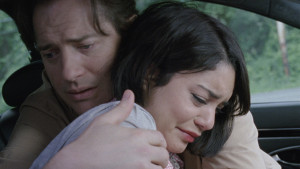Gimme Shelter almost didn’t make it into theaters. It was too high budget, well made, and powerful in its message for many Hollywood types. You may ask, “Why wouldn’t Hollywood want to release a movie of such high quality?” It all had to do with the theme: it has a strong pro-life message. The director, Ron Krauss, who has a solid reputation in Tinseltown, was stunned at the resistance to the film. In his words,
It’s a miracle that this film is even being released. I can’t tell you what I went through to get this film out. I spent literally almost a year pushing and pushing people to get this movie out. A lot of people in Hollywood actually went out of their way to make sure this movie would not come out. People tried to pay me off—and I just kept saying, No, no, no, no, no. And then I came across someone who was willing to help me.
The pushback is due entirely to the pro-abortion mentality that dominates the industry. It’s a story in itself. Maybe someone should make a movie about it.
 I went to see Gimme Shelter over the weekend and was deeply impressed by the portrayal of a young woman passed from one foster home to another, then caught in a hellish situation in her drug-addicted mother’s home, if you can stretch the word “home” to cover the disgusting environment into which she was dumped. The lead actress, Vanessa Hudgens, who, I discovered, is pretty well known [so much for my ability to stay abreast of pop culture] is a marvel in the role of “Apple,” the young girl who breaks away from her mother’s destructive influence. She flees to an affluent father she never knew, but neither he nor his wife can figure out what to do with her.
I went to see Gimme Shelter over the weekend and was deeply impressed by the portrayal of a young woman passed from one foster home to another, then caught in a hellish situation in her drug-addicted mother’s home, if you can stretch the word “home” to cover the disgusting environment into which she was dumped. The lead actress, Vanessa Hudgens, who, I discovered, is pretty well known [so much for my ability to stay abreast of pop culture] is a marvel in the role of “Apple,” the young girl who breaks away from her mother’s destructive influence. She flees to an affluent father she never knew, but neither he nor his wife can figure out what to do with her.
Upon finding out she’s pregnant, the absentee father and wife decide she should have an abortion. As she sits in the clinic, awaiting the “doctor,” she pulls out the sonogram of her unborn child and, struck by the idea of new life growing within her, races out of the clinic, away from everyone, and takes up life on the streets.
 Scared and threatened by everything and everyone around her on the streets, she hijacks a car, which leads to a terrible accident that puts her in the hospital. Here is where a gritty, heartbreaking film morphs into a slowly unfolding saga of redemption. James Earl Jones, playing a Catholic priest, comes to see her, eventually making a connection, and gently leads her to a Catholic shelter for pregnant, unwed mothers.
Scared and threatened by everything and everyone around her on the streets, she hijacks a car, which leads to a terrible accident that puts her in the hospital. Here is where a gritty, heartbreaking film morphs into a slowly unfolding saga of redemption. James Earl Jones, playing a Catholic priest, comes to see her, eventually making a connection, and gently leads her to a Catholic shelter for pregnant, unwed mothers.
The shelter is run by a caring, yet no-nonsense, woman who has given her life to helping those in Apple’s situation. I liked the depiction of the founder of the shelter. Christian faith is everywhere to be seen in the environment, yet she is not some starry-eyed do-gooder. She knows the type of girls she deals with and is forthright with them, making sure they follow the rules, while simultaneously exhibiting love that they’ve never known before. This shelter, and others run by this woman, Kathy DiFiore, are real, not fabricated for the movie. Some of the young women at the shelter are in the movie, essentially playing themselves.
 Apple doesn’t immediately take to the new environment. The film realistically shows that it may take quite a while for damaged people to warm up to those who are sincerely seeking their good. The father she never knew, played by Brendan Fraser, becomes a sympathetic figure in the end, earnestly wanting to make Apple part of his new family. Her response to that was somewhat surprising to me, but again, probably realistic.
Apple doesn’t immediately take to the new environment. The film realistically shows that it may take quite a while for damaged people to warm up to those who are sincerely seeking their good. The father she never knew, played by Brendan Fraser, becomes a sympathetic figure in the end, earnestly wanting to make Apple part of his new family. Her response to that was somewhat surprising to me, but again, probably realistic.
Here’s a behind-the-scenes fact: both Fraser and Jones donated their salaries to the shelters run by Kathy DiFiore because they believe so strongly in her ministry.
I won’t try to divulge the entire story. That’s for you to find out when you go see it. And see it, you should.
